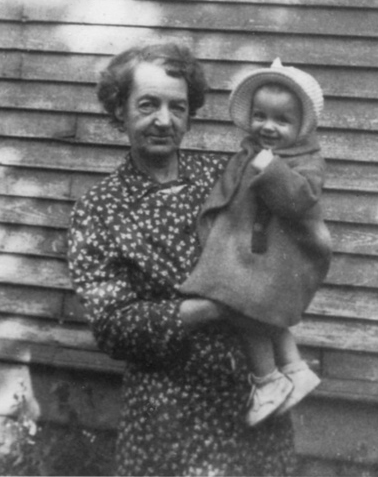The Good Old Days
By Kate Maynard
When I was still a girl many, many moons ago, my mother had told me that my grandfather, George Franklin "Frank" Gilliland, had a "peg leg" as she called it, the result of losing his limb in a work accident. I recently came across two related articles about this incident from The Portsmouth (Ohio) Times (Crushed By A Triple Block) and in doing so, found a greater respect for him and the struggles he faced in raising a family during the Great Depression of the late 20's and 30's. At a time before most workers had anything resembling compensation or health and retirement benefits, if a man didn't work, the family didn't eat. My grandfather, a steam shovel operator, had to compete against younger and more able-bodied men for the few jobs available.
For these reasons my grandfather often had to travel far for work at on-site jobs. Despite his best efforts my mother's family was poor, so much so that there was little to eat and certainly no money left over for doctors. My uncle, Warren Gilliland, suffered from tuberculosis of the hip, a condition which left one leg much shorter than the other. Back then you dealt the hand you were given and in order to help support the family, Warren passed newspapers for a pittance, an effort for a boy struggling with a disability. My mother recalled that one day when leaving school, exhausted and in pain, my uncle Warren sat on the steps of the old Portsmouth High School and cried. Then, evidently having decided he'd sufficently indulged himself, he struggled to his feet and resumed his job passing the papers. Warren was a good man and caring towards his family.
Still, my Gilliland family could find humor even in the darkest of times. My mother recalled that her brother Warren was stellar in accepting responsibilities for the family but was an absolute failure at one task, stoking the single, old coal-fired stove that kept the family a breath away from freezing during the long winters. Living near the railroad tracks for the old Norfolk & Western, the children would wait for a passing train and with baskets in hand, join others in rushing out to collect bits of coal that had fallen from the passing hoppers. It was Warren's job to turn these precious nuggets into a fire that would last the night. Many a morn it was that my mother and my aunt Margaret would rush to the old stove to warm themselves only to find it stone cold and themselves left with only ice water with which to splash their faces before rushing off to school. The capper, my mother related with amusement, was the morning she awoke to find the lone family pet, a goldfish, frozen solid in his bowl. A wonderful man, my mother repeated about Warren, but for the life of him he just couldn't keep a fire going.
While still a teen, in exchange for food, Warren took a job at the local relief agency for the county. He was very well-liked by those who worked at the agency, so much so that when his father (my grandfather) became seriously ill with pneumonia, they offered to make arrangements for him to be hospitalized. My grandfather, who was still working at construction sites at an age when most would be enjoying retirement, had contracted the disease but continued on the job until the condition became so acute he was forced to take to his bed. Lacking sufficient monies for proper medical care, he was tended at home until my uncle Warren's employer approached him with a proposition. His employer could arrange for a bed at a state hospital at no cost -- but there was a catch. The hospital was the Athens State Hospital, also known in that day as the Athens Asylum for the Insane. If the family could bear the shame of it, my grandfather would be given the care he needed and the chance to live. My grandmother, Mary Gilliland, agreed to have Frank transported to Athens, yet it was too late for her husband. Within four days of arriving at the Athens Hospital he succumbed to pneumonia. My mother's last memory of her father, still recalled in a voice softened with great sadness, was the tortured sound of her father's breathing, an echo that followed her down the cavernous corridor after that last good-bye.
The "good old days"... What idyllic images are conjured up by that hackneyed phrase, those days of picnics on the lawn while bands played on at the public pavilion, of buggy rides and county fairs, of penny candy and the dime that bought you a ticket for the double feature playing at the Columbia Theatre. How time repaints even the darkest canvas with brighter colors. Among my mother's fondest memories are the Fourth of July gatherings hosted at the home of her aunt, Ada Gilliland Mann, from whose house in South Point the collected children could view the fireworks display over the Ohio River. This dazzling splendor of light and color that gloriously upstaged even a moonless night created a memory that could make a child feel rich like no other, even without a penny in her pocket.
These were the good old days that forged the greatest generation, the hard steel hammered from lives that took equal measures of the good times and bad, and became the stronger for it. At the recent celebration of my mother's 90th birthday, I was reminded that she is among the dwindling number of those for whom the "good old days" can be recounted in the first person. To her and to the generations before her, I am both humbled and eternally grateful.
Thanks for the memories.
Family Photos

My grandmother, Mary Dice Gilliland, holding my sister Mary, circa 1944.